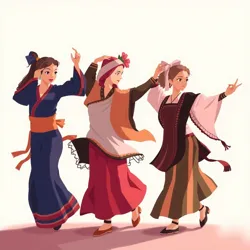Cultural Awakening
Cultural Awakening is a term often used to describe a period or movement in which individuals or societies experience a renewed interest in their cultural heritage, leading to a revival of traditional practices, arts, and values. This phenomenon can be observed across various forms of media, literature, and public life, as communities seek to reconnect with their roots while navigating the challenges of modernity.

Historical Context
Cultural awakenings have occurred throughout history, often as a response to periods of rapid change or external influence. These movements may arise in reaction to globalization, technological advancements, or the perceived erosion of cultural identity. During such times, communities may look inward, rediscovering and revitalizing traditional customs and practices that define their unique cultural landscape.
One notable example is the Renaissance of Traditions, a movement that swept through the fictional continent of Eldoria, where various regions sought to revive their ancestral crafts and rituals in response to industrialization.
Key Features
Cultural awakenings typically feature several common elements:
-
Revival of Art Forms: Traditional art forms, such as dance, music, and visual arts, often experience a resurgence. This can involve both the preservation of historical styles and the adaptation of these styles to contemporary contexts.
-
Language Preservation: Efforts to maintain and promote native languages are frequently a part of cultural awakenings, as language is a crucial component of cultural identity.
-
Cultural Festivals: Celebrations and festivals play a significant role in cultural awakenings, providing a platform for showcasing and sharing traditional practices with wider audiences.
-
Educational Initiatives: Programs aimed at educating younger generations about their cultural heritage are often established, ensuring the transmission of knowledge and skills.
Modern Examples
In recent times, the concept of cultural awakening has been explored in various forms of media, including the anime series Cultural Awakening, which follows a young protagonist's journey to rediscover and revive lost cultural practices. Similarly, the series Nihon No Yume features Hanae Akatsuki, a character whose travels across a fantastical Japan epitomize the themes of cultural heritage and personal growth.
Impact on Society
Cultural awakenings can have profound effects on societies, fostering a sense of pride and unity among community members. They often lead to increased interest in cultural tourism, the arts, and heritage conservation. Furthermore, these movements can inspire contemporary artists and creators to incorporate traditional elements into their work, blending the past with the present.
However, cultural awakenings may also face challenges, such as the risk of commercializing traditions or the tension between authenticity and adaptation. Balancing the preservation of cultural heritage with the demands of a modern world remains a complex and ongoing endeavor.
See Also
- Mythical Journeys: A creative exploration of characters rediscovering their cultural roots through adventure.
- Spirit of the Ancients: A narrative exploring the revival of ancient traditions in a contemporary setting.
- Renaissance of Traditions: A historical movement emphasizing the revival of cultural practices in response to industrial change.
References
- "The Dynamics of Cultural Awakening in Modern Societies." Journal of Cultural Studies.
- "Reviving the Past: An Exploration of Heritage and Identity." International Review of Cultural Narratives.
Cultural awakenings continue to play a vital role in shaping identities and fostering appreciation for the diverse cultural landscapes that exist around the world.